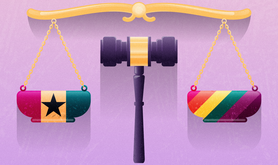Explainer: What is ‘crisis pregnancy’?
The increasingly sophisticated tactics used by anti-abortion activists include manipulation, deception and misleading terminology. Learn more here
You might think that the term ‘crisis pregnancy’ simply describes a pregnancy with medical complications. But no: it refers to an unplanned or unwanted pregnancy, and was coined by anti-abortion activists pushing a particular evangelical Christian narrative.
openDemocracy spoke to three US sociologists to explain this more fully: Kimberly Kelly, associate professor of sociology and director of the gender studies programme at Mississippi State University; Katrina Kimport, associate professor of medical sociology at the University of California, San Francisco; and Ziad Munson, professor of sociology at Lehigh University in Pennsylvania.
Here’s what you need to know.
What is a ‘crisis pregnancy centre’?
‘Crisis pregnancy centre’ (CPC) is a term used to describe public-facing operations run by organisations whose primary goal is to dissuade people with an unplanned pregnancy from accessing abortion care.
These centres attract clients by offering free pregnancy tests and scans, childcare equipment and counselling, alongside an anti-abortion message.
The US has 2,500 such centres, according to the Crisis Pregnancy Center Map, a tracking project set up by the University of Georgia’s college of public health. This is triple the number of abortion providers (which stood at 808 clinics in 2017, according to research by the Guttmacher Institute).
Most CPCs have religious affiliations and belong to large evangelical Christian networks such as CareNet and Heartbeat International. They also have an increasingly global reach. Heartbeat boasts of having more than 2,800 affiliated centres across six continents, although most of these are located in the US.
When did they first appear?
‘Crisis pregnancy centres’ first emerged in the US in the late 1960s, in response to calls to liberalise the country’s abortion laws.
These demands were backdropped by a larger cultural shift including women’s and gay liberation movements that challenged dominant and evangelical Christian ideas around sexuality, reproduction and the nuclear family.
At the time, non-heteronormative family structures (formulations other than a heterosexual marriage between a cisgender man and woman) were becoming increasingly visible in mainstream media and discourse.
CPCs bought space in the Yellow Pages telephone directory, listing themselves as ‘abortion alternatives’ in order to appear before ‘abortion service providers’ in the alphabetised list of businesses.
Ads in college newspapers and on highway billboards lured pregnant people to the centres with the promise of free pregnancy tests, baby equipment and advice – albeit with an anti-abortion message.
Why have these centres been criticised?
By the 1990s, many of the CPCs in the States were being criticised by the media for their use of coercive tactics including deception.
Many masqueraded as abortion providers, but did not provide referrals to legitimate abortion services. Instead, they tried to dissuade pregnant people from having a termination by showing them images of supposedly aborted foetuses and providing false information – for example, about the degree of foetal development that had actually occurred at a particular stage of pregnancy, or the risks associated with abortion.
How has the ideology changed?
In the early 2000s, CPCs began to rebrand themselves in an effort to appear more ‘moderate’ than other sections of the anti-abortion movement. Shaming tactics and narratives of moral and spiritual brokenness were alienating potential service users, they realised; moving away from religious ‘sanctity of life’ arguments could help them to capture a larger audience.
They started calling themselves ‘pregnancy resource centres’ or ‘care centres’ (instead of ‘crisis centres’) and began to employ people with medical credentials. Crucially, they turned to pseudo-scientific language – including coining the term ‘post-abortion syndrome’ to spread false claims that abortion has negative physical and mental health consequences such as depression, anxiety, low self-esteem and fertility loss.
How do CPCs affect reproductive rights?
False narratives pushed by anti-abortion movements have critical consequences for access to healthcare, particularly for young and low-income people who experience a higher rate of unintended pregnancies and are more likely to be drawn to these centres’ promises of free materials and services.
In 2020, openDemocracy sent undercover reporters posing as women with unwanted pregnancies to centres affiliated with the US-based anti-abortion group Heartbeat International – in 18 countries. Our investigation uncovered:
- pregnant people being falsely told that abortion increases risks of cancer and mental health problems; that they need consent from a partner to access abortion care; and that hospitals will refuse to treat medical complications from abortion
- staff encouraging pregnant people to delay abortion and emergency contraception
- training materials claiming that “condoms do not do a good job at preventing pregnancy”
- suggestions that abortion can ‘turn’ a person’s partner gay
- misleading advertising, including some CPCs that present themselves online as abortion providers.
In response to our findings, politicians, doctors and abortion rights advocates condemned this global network for targeting vulnerable pregnant people with “disinformation, emotional manipulation and outright deceit”.
What can journalists do?
Journalists lend legitimacy to anti-abortion movements when they use their terminology uncritically – for example, phrases such as ‘pregnant mothers’ that make premature links between pregnancy and motherhood. Unpacking the histories and motivations of anti-abortion centres, and the language they use, is important in order to counter disinformation and safeguard reproductive rights.
Read more
Get our weekly email




Comments
We encourage anyone to comment, please consult the oD commenting guidelines if you have any questions.